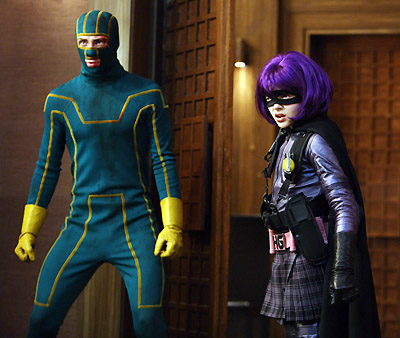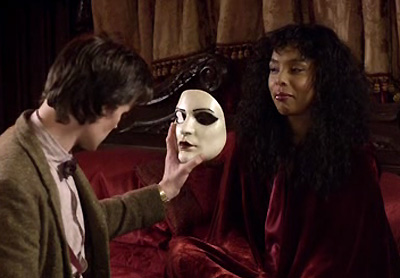the word is now a virus: Pontypool
 Pontypool is in one way a simple satire with a single didactic message: English-speaking media is turning citizens into empty-headed and desperately violent zombies, and the only way to save yourself is to excise the language entirely. Metaphorical tumor and healthy flesh must be sacrificed together, and refuge is to be found in the less id-baiting vocabulary of Lacan’s French.
Pontypool is in one way a simple satire with a single didactic message: English-speaking media is turning citizens into empty-headed and desperately violent zombies, and the only way to save yourself is to excise the language entirely. Metaphorical tumor and healthy flesh must be sacrificed together, and refuge is to be found in the less id-baiting vocabulary of Lacan’s French.
Why Lacan? The seemingly random words that punctured each person with this verbal infection made me think of his famous near-koan, “a letter always arrives at its destination.”
Horror is at its most effective, though, when it has some solid conceptual underpinnings, remains faithful to them, and – most importantly – allows the audience to ignore them completely. Fortunately, as the Spoony One pointed out (getting us interested enough to rent it), Pontypool has another showy concept up its sleeve: it’s practically a radio play, relying on audience imagination for the first two acts.
This leads to the film’s most common criticism, that it cheaps out on showing the horror that a viewer presumably expects to see based on the cover art. Unsurprisingly, I disagree. I love zombie flicks, but they’re samey in their special effects and “shocking” gore notes. They’re almost comforting that way, like a bedtime story you’ve heard read a hundred times…assuming your father was Jeffrey Dahmer. If a character on a crackly phone line describes an undead mob converging on a victim, I’ve got the mental image in place by the fourth word. If that mob is dog-piling on a family’s car while imitating windshield-wiper blades…I’ve got to work a little harder for it, and when the visual finally clicks…hoo boy. There’s no filmed scene that could ever match up.
Another benefit of this limitation is that it puts us inside the media body that in a typical horror flick would conveniently contextualise the mayhem with an explanation of the source, and provide an arrow toward the survivors’ solution if not the solution itself. Here, they desperately try to put together disparate reports into a coherent story to tell (because it has to be a story to be news, not just isolated facts), while debating whether they should be repeating any of it on air. Is it true, is it a prank, is it in fact life-and-death real and could get them fined for accidentally broadcasting the inappropriate reality of madness and death?
The virus, and the film, move on understanding. Currently unknown English words (although ones pertaining to love and hate, most beloved hot-buttons of infotainment, are early favorites) carry a new sort of virus, one that takes hold in the ephemeral moment when someone not just hears the word but understands it. (It’s reasonable to suspect that this will not be one of evolution’s fortunate mutations, as a successful word virus would be more like William S. Burrow’s conception of the written word as a symbiotic virus that made speech possible, not one that invariably led to its host eating all other potential hosts and then exploding.) What then? If Burroughs is right, we can’t halt our internal vocalisation, and that inevitably spills out verbally, possibly carrying the fatal virus and delivering that letter to anyone near you, or listening at home.
The film plays with the fuzzy dividing line between signal and noise. They broadcast a clear signal, but the words on it are difficult. The small town listening thrives on gossip and speculation, and fuelling this will only lead to the station’s censure, right or wrong. Give them only the boring but comprehensible signal, none of the primal and artistic noise. But the new dj, like all in his profession, thrives on attention, negative as much or more than positive. Words are not only his livelihood, they are his joy, leaping straight from his fluidly rhizoid brain to his lips, layering grains of exact truth with rhythm and melodrama. Facts and speculations fling themselves into the de-sanctified studio too quickly to be comprehended, let alone judge. As the dj states in the film’s opening monologue about a lost cat named “Honey”:
Well, Norman Mailer, he had an interesting theory that he used to explain the strange coincidences in the aftermath of the JFK assasination. In the wake of huge events, after them and before them, physical details, they spasm for a moment; they sort of unlock and when they come back into focus they suddenly coincide in a weird way. Street names and birthdates and middle names, all kind of superfluous things appear related to each other.
These details seemed related because the JFK assassination and its aftermath happened live on television. It was a seemingly direct experience, just filtered through media’s commercial imperatives. It became a story, and in a story, everything should connect, but where was the author?
A foreign doctor seemingly at the centre of the disturbances appears right on cue. They want him to explain what’s going on, he wants to explain what’s going on, they give him a microphone, and…they keep getting distracted. The speed of incoming fragments makes them feel urgent, even though they only give information we already know (something contagious is making people behave incomprehensibly), while the doctor is offering solid intel on how the affected act, and how to hide from them. But noise is news; noise gets priority.
The story of the happening has to be plucked from noise. Here’s where the writing and acting are particularly strong, with characters speaking in elliptical, semi-conscious prestidigitation, trying to verbally camouflage their own fears and secrets. Early on, the show’s producer defends specific townspeople who are precariously recovering alcoholics just trying to hold onto their jobs; later, she seeks refuge in the dj’s bottle of Glenfiddich and refers to being continually drunk at the end of her marriage. Ah…so her earlier words were partly about herself, and partly a feint away from “I’m an alcoholic and your jokes about drunks are painful.”
That, or anyone would hit the bottle during a painful divorce or “conversationalist” zombie siege, and it has nothing to do with her comment before. Is Honey the lost cat, and the dj’s broadcast about her, at the epicentre of the outbreak, or is it just a coincidence that the animal’s name is in the “love” circle of seemingly infected words? It appears to line up, strung together by adequate coincidences, to produce meaning, but are you convinced? What’s your criteria for being convinced; do you even know? Meanwhile, doom is close…so they tell you.
My impression: the dj and producer are carriers, Typhoid Marys, able to fight off the disease themselves but also infecting every poor soul who hears them. They are both depressed, both regularly self-medicating, and unable to meaningfully connect with others. They both want to – the dj’s handmade Valentine’s Day cards for his coworkers, the producer’s fatal phone calls to her distant children – but are only hearing others through a thick filter of helpless gloom, distorting their meaning. Their well-meaning attempts to warn listeners – not-so-incidentally skyrocketing their own profile in the process – are spreading the disease to everyone who tunes in from as far away as the UK via a BBC simulcast. Their dissociated thinking can save them, but trying to pass the trick on to others is impossible as even they don’t truly know
Where did the virus come from; did the mysterious doctor create it or just study its rapid development? It’s inconceivable in any case, right? Barack Obama is a Muslim from Kenya who wants to put Grandpa in front of a death panel, and Dick Cheney personally orchestrated September 11 2001 to justify his imperialist war machine. Desecrating a holy text is a Christian act; that potential desecration justifies violent demonstrations against uninvolved parties. How have sections of societies been infected with these illogical ideas?
Frankly, the world would be better off with the conversationalist zombies.
Also: I have no idea what to make of the dadaist stinger after the credits, but if it were a movie I would buy the dvd and every scrap of related merchandise.






